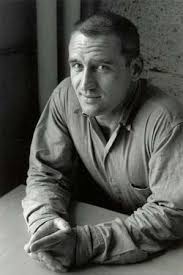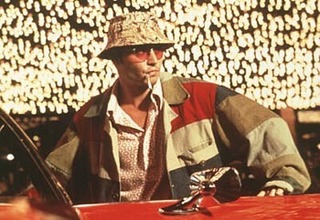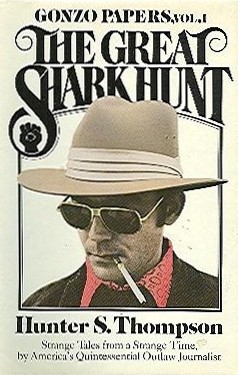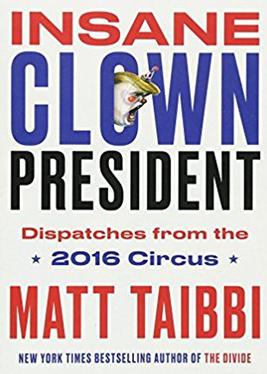Contents
Songs of the Doomed is a collection of essays, short stories, and newspaper articles written by Thompson during his career. The book is separated into five sections: "The Fifties: Last Rumble in Fat City", "The Sixties: What the Hell? It's Only Rock and Roll...", "The Seventies: Reaping the Whirlwind, Riding the Tiger", "The Eighties: How Much Money Do You Have?", and "Welcome to the Nineties: Welcome to Jail".
Author's Note
Let the Trials Begin / Electricity / Last Train from Camelot / Note from Ralph Steadman
The Fifties: Last Rumble in Fat City
Tarred and Feathered at the Jersey Shore / Saturday Night at the Riviera / Prince Jellyfish / Fleeing New York
The Sixties: What the Hell? It's Only Rock and Roll...
Letter to Angus Cameron / The Rum Diary / Revisited: The Puerto Rican Problem / The Kennedy Assassination / Back to the U.S.A. / Hell's Angels: Long Nights, Ugly Days, Orgy of the Doomed / Midnight on the Coast Highway / Ken Kesey: Walking with the Kind / LSD-25: Res Ipsa Loquitor / Chicago 1968: Death to the Weird / First Visit with Mescalito
The Seventies: Reaping the Whirlwind, Riding the Tiger
Iguana Project / Never Apologize, Never Explain / Vegas Witchcraft / High-Water Mark / Fear and Loathing / Lies / Ed Muskie Doomed by Ibogaine / Washington Politics / Summit Conference in Elko: Secret Gathering of the Power Elite / Opening Statement: HST / Rolling Stone: Abandon All Hope Ye Who Enter Here / Dance of the Doomed / Checking into the Lane Xang / Whooping it up with the War Junkies / Confidential Memo to Colonel Vo Don Giang / Memo to Jim Silberman on the Death of the American Dream / Letter to Russell Chatham
The Eighties: How Much Money Do You Have?
Welcome to the 80's / Love on the Palm Beach Express / Sugarloaf Key / The Silk Road / Letter to Ralph Steadman / Letter to Ken Kesey / Last Memo from the National Affairs Desk / Memo from the Sports Desk / Wild Sex in Sausalito / The Dukakis Problem: Another vicious beating for the New Whigs / Secret Cables to Willie Hearst / San Francisco Examiner Columns / The New Dumb / Fear and Loathing in Sacramento / Whiskey Business / I knew the Bride When She Used to Rock and Roll / Community of Whores / Return to the Riviera Cafe / Avery: Making Sense of the 60's / German Decade: Rise of the Fourth Reich / Turbo Must Die / Memo to Jay Johnson / Warning Issued on Cocaine
Welcome to the Nineties: Welcome to Jail
Death metal is an extreme subgenre of heavy metal music. It typically employs heavily distorted and low-tuned guitars, played with techniques such as palm muting and tremolo picking; deep growling vocals; aggressive, powerful drumming, featuring double kick and blast beat techniques; minor keys or atonality; abrupt tempo, key, and time signature changes; and chromatic chord progressions. The lyrical themes of death metal may include slasher film-style violence, political conflict, religion, nature, philosophy, true crime and science fiction.

Hunter Stockton Thompson was an American journalist and author, regarded as one of the principal pioneers of New Journalism, along with Gay Talese, Truman Capote, Norman Mailer, Joan Didion, and Tom Wolfe. He rose to prominence with the publication of Hell's Angels (1967), a book for which he spent a year living with the Hells Angels motorcycle club to write a first-hand account of their lives and experiences. In 1970, he wrote an unconventional article titled "The Kentucky Derby Is Decadent and Depraved" for Scanlan's Monthly, which further raised his profile as a countercultural figure. It also set him on the path to establishing his own subgenre of New Journalism that he called "Gonzo", a journalistic style in which the writer becomes a central figure and participant in the events of the narrative.

Neal Leon Cassady was a major figure of the Beat Generation of the 1950s and the psychedelic and counterculture movements of the 1960s.

Oscar "Zeta" Acosta Fierro was a Mexican American attorney, author and activist in the Chicano Movement. He wrote the semi-autobiographical novels Autobiography of a Brown Buffalo (1972) and The Revolt of the Cockroach People (1973), and was friends with American author Hunter S. Thompson. Thompson characterized him as a heavyweight Samoan attorney, Dr. Gonzo, in his 1971 novel Fear and Loathing in Las Vegas. Acosta disappeared in 1974 during a trip in Mexico and is presumed dead.

Jann Simon Wenner is an American businessman who is a co-founder of the popular culture magazine Rolling Stone, and former owner of Men's Journal magazine. He participated in the Free Speech Movement while attending the University of California, Berkeley. Wenner, with his mentor Ralph J. Gleason, founded Rolling Stone in 1967.
Extreme metal is a loosely defined umbrella term for a number of related heavy metal music subgenres that have developed since the early 1980s. It has been defined as a "cluster of metal subgenres characterized by sonic, verbal, and visual transgression".

Ralph Idris Steadman is a British illustrator best known for his collaboration with the American writer Hunter S. Thompson. Steadman is renowned for his satirical political cartoons, social caricatures, and picture books.

Raoul Duke is the partially fictionalized author surrogate character and sometimes pseudonym used by Hunter S. Thompson as the main character and antihero for many of his works. He is perhaps best known as the narrator for his 1971 autobiographical novel Fear and Loathing in Las Vegas. The book was originally written under the name Raoul Duke. The character wears a bucket hat and yellow tinted aviator sunglasses.

The Great Shark Hunt is a book by Hunter S. Thompson. Originally published in 1979 as Gonzo Papers, Vol. 1: The Great Shark Hunt: Strange Tales from a Strange Time, the book is a roughly 600-page collection of Thompson's essays from 1956 to the end of the 1970s, including the rise of the author's own gonzo journalism style as he moved from Air Force and sports beat writing to straight-ahead political commentary. It is the first of what would become four volumes in The Gonzo Papers series.

Where the Buffalo Roam is a 1980 American semi-biographical comedy film which loosely depicts author Hunter S. Thompson's rise to fame in the 1970s and his relationship with Chicano attorney and activist Oscar "Zeta" Acosta. The film was produced and directed by Art Linson. Bill Murray portrayed Thompson and Peter Boyle portrayed Acosta, who is referred to in the film as Carl Lazlo, Esq. A number of other names, places, and details of Thompson's life are also changed.

The Rum Diary is an early novel by American writer Hunter S. Thompson. It was written in the early 1960s but was not published until 1998. The manuscript, begun in 1959, was discovered among Thompson's papers by Johnny Depp. The story involves a journalist named Paul Kemp who, in the 1950s, moves from New York to work for a major newspaper, The Daily News, in San Juan, Puerto Rico. It is Thompson's second novel, preceded by the still-unpublished Prince Jellyfish.

Brewer & Shipley were an American folk rock duo who enjoyed their peak success in the late 1960s through the 1970s. The duo consisted of singer-songwriters Mike Brewer and Tom Shipley. They were known for their intricate guitar work, vocal harmonies, and socially conscious lyrics which reflected the concerns of their generation – especially the Vietnam War, and the struggles for personal and political freedom. Their greatest commercial success was the song "One Toke Over the Line" from their 1970 album Tarkio. They had two other singles on the Billboard charts: "Tarkio Road" (1970) and "Shake Off the Demon" (1971). They continued to perform, both separately and together, usually in the Midwest United States.

Palm Sunday is a 1981 collection of short stories, speeches, essays, letters, and other previously unpublished works by Kurt Vonnegut. The collection provides insight into Vonnegut's thoughts on various subjects, including writing, war, and his own literary career. The book is known for its eclectic mix of genres and personal reflections.

Fear and Loathing in Las Vegas is a 1998 American black comedy adventure film based on Hunter S. Thompson's novel of the same name. It was co-written and directed by Terry Gilliam and stars Johnny Depp and Benicio del Toro as Raoul Duke and Dr. Gonzo, respectively. The film details the duo's journey through Las Vegas as their initial journalistic intentions devolve into an exploration of the city under the influence of psychoactive substances.

Fear and Loathing in Las Vegas: A Savage Journey to the Heart of the American Dream is a 1971 novel in the gonzo journalism style by Hunter S. Thompson. The book is a roman à clef, rooted in autobiographical incidents. The story follows its protagonist, Raoul Duke, and his attorney, Doctor Gonzo, as they descend on Las Vegas to chase the American Dream through a drug-induced haze, all the while ruminating on the failure of the 1960s countercultural movement. The work is Thompson's most famous book and is noted for its lurid descriptions of illicit drug use and its early retrospective on the culture of the 1960s. Thompson's highly subjective blend of fact and fiction, which it popularized, became known as gonzo journalism. Illustrated by Ralph Steadman, the novel first appeared as a two-part series in Rolling Stone magazine in 1971 before being published in book form in 1972. It was later adapted into a film of the same title in 1998 by director Terry Gilliam, starring Johnny Depp and Benicio del Toro, who portrayed Raoul Duke and Dr. Gonzo, respectively.
The Gonzo Papers is a four volume series of books by American journalist and author Hunter S. Thompson published between 1979 and 1994. The word Gonzo is often used to describe the unique style of journalism that Thompson cultivated throughout his life.
Bibliography of works by American author and journalist Hunter S. Thompson.
Selah is a word used 74 times in the Hebrew Bible. Its etymology and precise meaning are unknown, though various interpretations are given.
Matt Duffield, also known as Matt Riviera, is an American politician and retired professional wrestler. He is formerly one half of the NWA World Tag Team Champions with Rob Conway as the tag team The Iron Empire. He also has promoted wrestling events. In addition to the wrestling business, he has also appeared in movies and television shows. He currently serves as a Republican member for the 53rd district of the Arkansas House of Representatives.

Insane Clown President: Dispatches from the 2016 Circus is a non-fiction book by Matt Taibbi about Donald Trump and the 2016 United States presidential election. The book contains illustrations by Rolling Stone artist Victor Juhasz. Taibbi's choice of title for the book was motivated by Trump's marketing style and is wordplay based on the name of American horrorcore band Insane Clown Posse. His work was inspired by Hunter S. Thompson, who had previously published Fear and Loathing on the Campaign Trail '72.













